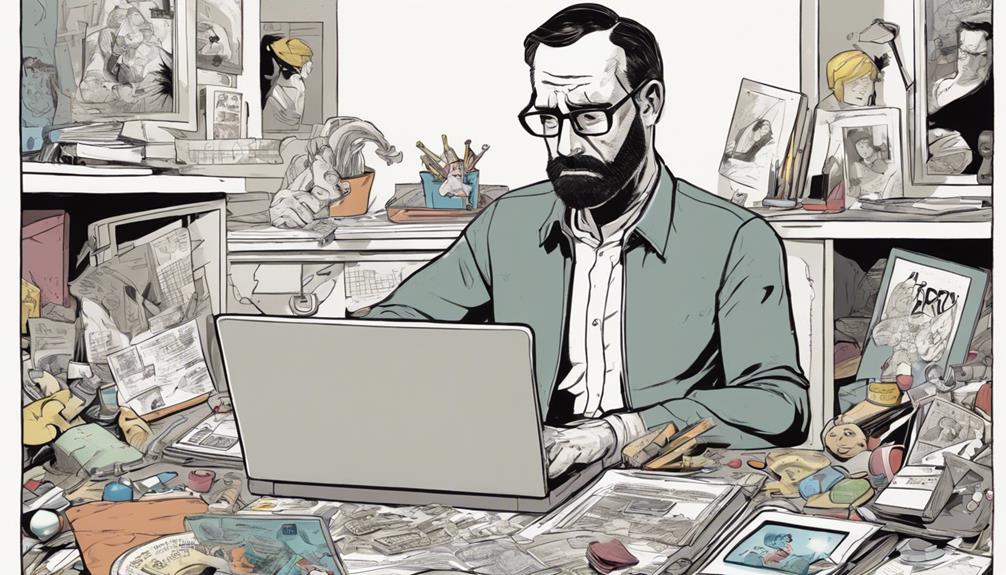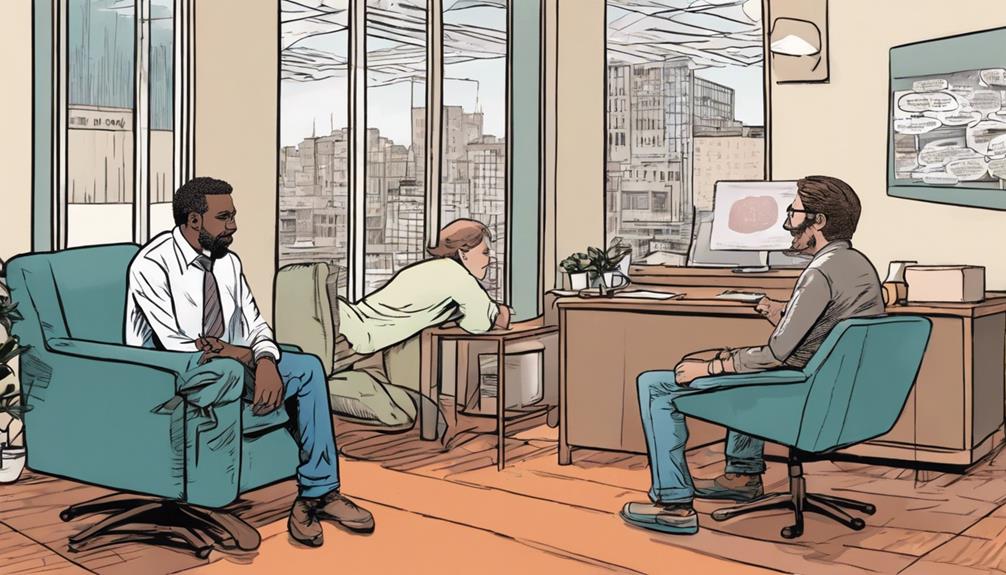Fatherhood poses distinct challenges, with fathers facing mental health issues often overlooked. Social media portrays unrealistic standards, hindering open discussions on dads' mental well-being. Balancing work and family roles can lead to high stress and diminished mental health. Depression rates are significant post-childbirth, with men facing pressure to conform to traditional masculinity norms. Breaking the silence on mental health and encouraging men to open up is essential. Normalizing help-seeking can lead to better mental health outcomes and healthier coping mechanisms. Understanding these issues is crucial for supporting fathers' mental well-being.
Key Takeaways
- Addressing stigma around male vulnerability is crucial for fathers' mental health.
- Encouraging open discussions about mental health struggles can break the silence.
- Normalizing help-seeking behavior among men is vital.
- Challenging traditional masculinity norms can promote seeking support.
- Creating a culture that supports emotional openness aids in breaking the silence.
Social Media Influence on Fatherhood
The impact of social media on fatherhood is significant. Platforms often portray unrealistic images that can contribute to feelings of inadequacy and hinder open discussions about mental health challenges faced by dads. Men may struggle to show vulnerability due to societal expectations perpetuated by Instagram culture, leading to increased stress and anxiety.
While some fathers are using social media to share their mental health struggles, there is a pressing need for more realistic depictions of fatherhood online. Advocates emphasize the importance of breaking down stereotypes and promoting honest conversations about the highs and lows of parenting.
Impact of Balancing Work and Family

Balancing work and family responsibilities presents a significant challenge for many fathers, with stress and pressure often accompanying the dual roles. The demands of providing for the family while being actively involved in childcare can take a toll on fathers' mental well-being. According to research, 75% of dads feel stress from balancing work and family, nearly 40% struggle with work-life balance, and 80% experience pressure to be the family's rock post-childbirth. Additionally, the sole breadwinning years post-childbirth are particularly challenging for men, negatively impacting their overall well-being. This struggle highlights the need for better support systems and understanding of the challenges fathers face in juggling work and family responsibilities.
| Work-Family Challenge Statistics | |
|---|---|
| 75% of dads feel stress balancing work and family | |
| Nearly 40% struggle with work-life balance | |
| 80% feel pressure to be the family's rock post-childbirth | |
| Sole breadwinning years post-childbirth are particularly challenging |
Prevalence of Depression in Men

Depression rates among men following childbirth reveal a significant public health issue. Globally, 26% of men exhibit signs of depression post-childbirth, marking postpartum depression as an important concern.
Men commonly experience feelings of being overwhelmed, anxious, and unable to cope, often exacerbated by the pressure to conform to traditional masculinity norms that discourage seeking help. The reluctance to open up about their mental health struggles leads to a higher prevalence of untreated mental health issues in men.
Addressing the stigma associated with male vulnerability and encouraging men to seek support is essential in combating the detrimental effects of postpartum depression on fathers' well-being. By acknowledging and addressing these mental health challenges, we can work towards creating a healthier environment for fathers to thrive in.
Importance of Men Opening Up

Addressing the stigma surrounding male vulnerability is essential in encouraging men to open up about their mental health struggles. Men are often socialized to be strong, stoic, and self-reliant, making it challenging for them to express emotions or seek help when facing mental health issues.
By breaking down societal expectations that discourage emotional openness, men can feel more comfortable sharing their feelings and seeking support. Opening up about mental health not only provides men with an outlet to address their struggles but also sets a positive example for their children and other men in similar situations.
Encouraging conversations around vulnerability can help normalize the idea that it's okay for men to show their emotions and ask for help when needed.
Normalizing Help-Seeking Behavior

Encouraging a shift towards a culture that embraces and normalizes seeking help is essential in supporting men's mental health and well-being. Men often struggle to reach out due to societal stigma surrounding help-seeking behavior. Normalizing this process can lead to improved mental health outcomes for fathers. By acknowledging that it's acceptable to ask for assistance, men can break free from the constraints of traditional masculinity norms and prioritize their well-being.
| Benefits of Normalizing Help-Seeking Behavior |
|---|
| Reduces stigma around mental health |
| Encourages early intervention |
| Promotes healthier coping mechanisms |
| Strengthens support networks |
Frequently Asked Questions
How Can Social Media Positively Impact Fatherhood?
Social media can positively impact fatherhood by fostering connections, sharing parenting experiences, and challenging societal norms. It provides a platform for dads to seek support, share vulnerabilities, and redefine traditional masculinity, promoting healthier father-child relationships.
What Strategies Can Help Fathers Balance Work and Family?
To balance work and family, fathers can prioritize time management, set boundaries, communicate openly with their partner, delegate tasks, seek support from family and friends, practice self-care, and reassess expectations. Flexibility and realistic goal-setting are key.
Are There Specific Risk Factors for Depression in Men?
Specific risk factors for depression in men include societal expectations of stoicism, role as the family's provider, and challenges balancing work and family. Traditional masculinity norms hinder seeking help. Honest conversations, support systems, and self-care are vital.
How Can Men Encourage Others to Open up About Struggles?
Men can encourage others to open up about struggles by leading through vulnerability, sharing personal experiences, and being supportive listeners. By challenging societal norms, promoting honest conversations, and seeking help when needed, men can create a culture of openness and support.
What Are Some Practical Ways to Normalize Help-Seeking for Dads?
To normalize help-seeking for dads, creating safe spaces for open discussions is essential. Encouraging honest conversations about mental health challenges, promoting positive role models, and highlighting the benefits of seeking support can dismantle stigmas and empower fathers to prioritize their well-being.
Conclusion
To sum up, the portrayal of fatherhood on social media emphasizes unrealistic expectations. The challenges of balancing work and family contribute to the stress and pressure men face. The prevalence of depression in men is a serious concern that often goes unnoticed. The importance of men opening up about their mental health struggles cannot be overstated.
All these factors highlight the need for a shift towards normalizing help-seeking behavior. By breaking the silence surrounding fathers' mental health, society can create a supportive environment where men feel empowered to prioritize their well-being and seek the necessary support for themselves and their families.










